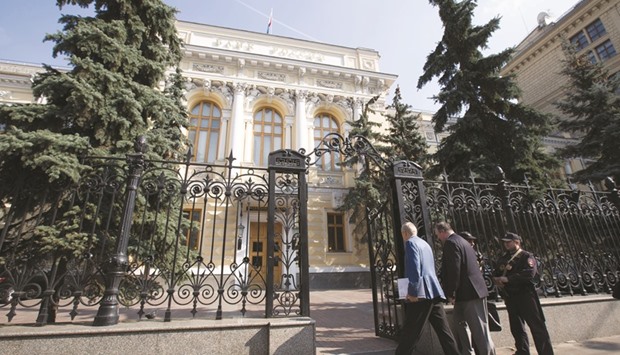Foreign investors aren’t taking the Bank of Russia’s “no” for an answer.
Despite the central bank’s pledge in September to hold interest rates at least through the end of the year, a bond-market anomaly still shows some remain confident that slowing inflation will allow for monetary easing to resume sooner rather than later.
Outside investors are pouring into the 5.4tn-rouble ($83bn) market, keeping yields below the 10% policy rate. With foreign ownership of local debt already near a record high, it’s a love affair bound to end in heartbreak, according to Schroder Investment Management.
“In a period of high volatility for emerging markets, the market is likely to be disappointed about the pace of rate cuts,” Jim Barrineau, a New York-based money manager at Schroder, which has about $450bn in assets worldwide, said by phone. “It’s unusual for the bond yields to be below the key rate. It’s a sign that the market is continuing to anticipate a lot of interest-rate cuts.”
Deemed by Morgan Stanley to be developing Europe’s “most orthodox” central banker, Governor Elvira Nabiullina has brooked little market dissent of her stance as policy makers chase next year’s 4% inflation goal. The Bank of Russia’s unprecedented commitment to leave borrowing costs unchanged after only two cuts this year already sought to rein in overly aggressive expectations of easing given that risks to price outlook persist.
Forward-rate agreements signal 33 basis points of rate cuts over the next three months, compared with last month’s high of 44 basis points. The central bank next meets to review borrowing costs on December 16.
Still, doubts abound, putting a wedge between eager foreign investors and local lenders that take a dimmer view. While the spread between 10-year bond yields and the key rate narrowed to 110 basis points from 256 in September, it’s grown wider again in the past two weeks, a sign the central bank’s control over the cost of money may be slipping away. It was at 115 basis points yesterday.
“For banks, the key rate is losing its significance as an indicator of the cost of long-term funding,” said Nikolay Minko, an analyst at Sberbank CIB.
While flush with cash after Russia’s banking system shifted into its first liquidity surplus in five years, lenders are keeping their distance from rouble bonds known as OFZs, hurting demand at the Finance Ministry’s debt auctions, according to Societe Generale’s Russian unit. Local banks are the biggest holders of OFZs.
“The funding for local banks remains expensive, and I don’t think they’ll be keen to actively buy OFZs,” said Evgeny Koshelev, an analyst at SocGen’s Rosbank in Moscow. The anomaly of yields below the key rate could disappear only by the end of next year when Rosbank expects the central bank to lower its benchmark to 9%, he said.
In the meantime, Russian yields continue to draw investors hunting for higher returns. The share of foreign holders of OFZs grew to 27% as of October 1, according to central bank data. That’s making local debt ever more vulnerable to volatility in global markets, as a brief selloff after US presidential elections showed this month.
The Finance Ministry may ride to the rescue, according to Oleg Popov, a money manager who oversees $300mn of assets at April Capital in Moscow.
Its plans to increase domestic borrowing more than fourfold next year will boost bond yields, shrinking the discount to the key rate, he said.
“I don’t think we should expect rate cuts in the next six months,” Popov said. “The Finance Ministry’s plan to fight the budget deficit via increased domestic borrowing may lift the bond yields, helping trim the yield anomaly.”
Expectations among foreign investors that President-elect Donald Trump will improve US relations with Russia is another factor driving outside demand for its debt, with Renaissance Capital expecting inflows into OFZs in case of a potential easing of sanctions imposed over the conflict in Ukraine. For now, that’s also little more than wishful thinking, according to Schroder Investment Management.
“There’s really very little evidence that Trump and Putin are going to be best friends and sanctions will be lifted,” said Barrineau, the emerging-market money manager at Schroder. “There’s a long way to go before that happens. In that aspect the market has gotten well ahead of itself.”

Visitors pass security to enter the Bank of Russia headquarters in Moscow. Despite the central bank’s pledge in September to hold interest rates at least through the end of the year, a bond-market anomaly still shows some remain confident that slowing inflation will allow for monetary easing to resume sooner rather than later.
